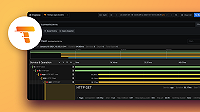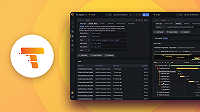This is documentation for the next version of Grafana Tempo documentation. For the latest stable release, go to the latest version.
Usage tracker
The usage tracker accurately tracks the amount of ingested traffic using a set of custom labels on a per-tenant basis, providing fine-grained control over your data.
Use the cost_attributes option to configure usage trackers in the distributor, which expose metrics of ingested traffic grouped by configurable attributes exposed on /usage_metrics.
Enable the usage tracker
To use this feature, you need to enable it in the distributor and configure the overrides to handle the data.
- Open your configuration file, for example,
tempo.yaml. - In the
distributorsection, locate thecost_attributionline. If it is not present, then copy and paste the example below into your distributor section and update the options.
usage:
cost_attribution:
# Enables the "cost-attribution" usage tracker. Per-tenant attributes are configured in overrides.
[enabled: <boolean> | default = false]
# Maximum number of series per tenant.
[max_cardinality: <int> | default = 10000]
# Interval after which a series is considered stale and will be deleted from the registry.
# Once a metrics series is deleted, it won't be emitted anymore, keeping active series low.
[stale_duration: <duration> | default = 15m0s]Configure overrides
You also need to configure the dimensions to break down your the usage data in the standard overrides. In the overrides section, you can define attributes to group ingested data by and you can rename and combine attributes.
For more information, refer to the standard overrides section of the Configuration documentation.
In this example, usage data is grouped by service.name.
# Overrides configuration block
overrides:
# Global ingestion limits configurations
defaults:
# Cost attribution usage tracker configuration
cost_attribution:
dimensions:
service.name: ""You can also configure per tenant in the runtime-overrides or in the user-configurable-overrides.
Review usage metrics
Once everything is configured, the usage metrics are exposed in the distributor:
GET /usage_metricsExample:
curl http://localhost:3200/usage_metrics
# HELP tempo_usage_tracker_bytes_received_total bytes total received with these attributes
# TYPE tempo_usage_tracker_bytes_received_total counter
tempo_usage_tracker_bytes_received_total{service_name="article-service",tenant="single-tenant",tracker="cost-attribution"} 7327
tempo_usage_tracker_bytes_received_total{service_name="auth-service",tenant="single-tenant",tracker="cost-attribution"} 8938
tempo_usage_tracker_bytes_received_total{service_name="billing-service",tenant="single-tenant",tracker="cost-attribution"} 2401
tempo_usage_tracker_bytes_received_total{service_name="cart-service",tenant="single-tenant",tracker="cost-attribution"} 4116
tempo_usage_tracker_bytes_received_total{service_name="postgres",tenant="single-tenant",tracker="cost-attribution"} 3571
tempo_usage_tracker_bytes_received_total{service_name="shop-backend",tenant="single-tenant",tracker="cost-attribution"} 17619You can configure Prometheus to scrape this endpoint to collect usage metrics.
Example:
scrape_configs:
- job_name: 'tempo-usage'
static_configs:
- targets: ['<DISTRIBUTOR-HOST>:3200']
metrics_path: '/usage_metrics'Scope dimensions by resource or span
You can configure dimensions to look for attributes at specific scopes using prefixes:
resource.<attribute>- Look only at resource-level attributesspan.<attribute>- Look only at span-level attributes<attribute>(no prefix) - Look at both resource and span levels
Example:
overrides:
defaults:
cost_attribution:
dimensions:
resource.service.name: "service" # Scoped by resource, only look at `service.name` in resource attributes.
span.db.system: "database" # Scoped by span, only look at `db.system` in span attributes.
k8s.namespace.name: "namespace" # Unscoped, look at `k8s.namespace.name` in both resource and span attributesNote
When using unscoped attributes (no prefix), span-level attributes will always overwrite resource-level attributes if both exist.
This can lead to mixed values from both scopes, use scope prefixes (
resource.orspan.) for predictable behavior when attributes exist at both and you only want values from one of them.
This table provides more information about the behavior:
Configure target labels
You can customize the label names that appear in the /usage_metrics metrics by configuring a custom label name in the dimensions configuration.
dimensions:
<ATTRIBUTE_NAME>: "<LABEL_NAME>"Note
The
_<LABEL_NAME>_should be a valid Prometheus label name. If you provide an invalid label name, Tempo sanitizes it.
Example:
overrides:
defaults:
cost_attribution:
dimensions:
service.name: "" # Results in: service_name
span.service.name: "" # Results in: service_name
resource.service.name: "" # Results in: service_name
span.db.system: "" # Results in: db_system
span.db.system: "database.type" # Results in: database_type
k8s.namespace.name: "namespace" # Results in: namespace

